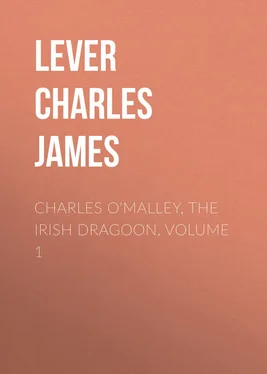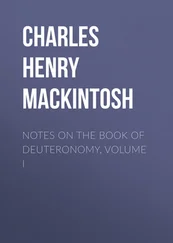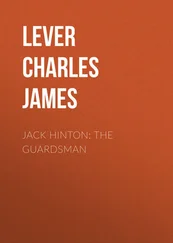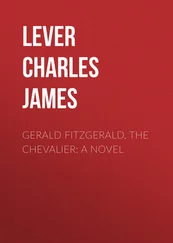Charles Lever - Charles O'Malley, The Irish Dragoon, Volume 1
Здесь есть возможность читать онлайн «Charles Lever - Charles O'Malley, The Irish Dragoon, Volume 1» — ознакомительный отрывок электронной книги совершенно бесплатно, а после прочтения отрывка купить полную версию. В некоторых случаях можно слушать аудио, скачать через торрент в формате fb2 и присутствует краткое содержание. Издательство: Иностранный паблик, Жанр: literature_19, foreign_antique, foreign_prose, на английском языке. Описание произведения, (предисловие) а так же отзывы посетителей доступны на портале библиотеки ЛибКат.
- Название:Charles O'Malley, The Irish Dragoon, Volume 1
- Автор:
- Издательство:Иностранный паблик
- Жанр:
- Год:неизвестен
- ISBN:нет данных
- Рейтинг книги:4 / 5. Голосов: 1
-
Избранное:Добавить в избранное
- Отзывы:
-
Ваша оценка:
- 80
- 1
- 2
- 3
- 4
- 5
Charles O'Malley, The Irish Dragoon, Volume 1: краткое содержание, описание и аннотация
Предлагаем к чтению аннотацию, описание, краткое содержание или предисловие (зависит от того, что написал сам автор книги «Charles O'Malley, The Irish Dragoon, Volume 1»). Если вы не нашли необходимую информацию о книге — напишите в комментариях, мы постараемся отыскать её.
Charles O'Malley, The Irish Dragoon, Volume 1 — читать онлайн ознакомительный отрывок
Ниже представлен текст книги, разбитый по страницам. Система сохранения места последней прочитанной страницы, позволяет с удобством читать онлайн бесплатно книгу «Charles O'Malley, The Irish Dragoon, Volume 1», без необходимости каждый раз заново искать на чём Вы остановились. Поставьте закладку, и сможете в любой момент перейти на страницу, на которой закончили чтение.
Интервал:
Закладка:
Charles James Lever
Charles O'Malley, The Irish Dragoon, Volume 1
TO THE
MOST NOBLE THE MARQUESS OF DOURO, M.P., D.C.L., ETC., ETC.
MY DEAR LORD, —
The imperfect attempt to picture forth some scenes of the most brilliant period of my country’s history might naturally suggest their dedication to the son of him who gave that era its glory. I feel, however, in the weakness of the effort, the presumption of such a thought, and would simply ask of you to accept these volumes as a souvenir of many delightful hours passed long since in your society, and a testimony of the deep pride with which I regard the honor of your friendship.
Believe me, my dear Lord, with every respect and esteem,
Yours, most sincerely,
THE AUTHOR. BRUSSELS, November, 1841.A WORD OF EXPLANATION
Having so lately taken my leave of the stage, in a farewell benefit, it is but fitting that I should explain the circumstances which once more bring me before you, – that I may not appear intrusive, where I have met with but too much indulgence.
A blushing debutante — entre nous , the most impudent Irishman that ever swaggered down Sackville Street – has requested me to present him to your acquaintance. He has every ambition to be a favorite with you; but says – God forgive him – he is too bashful for the foot-lights.
He has remarked – as, doubtless, many others have done – upon what very slight grounds, and with what slender pretension, my Confessions have met with favor at the hands of the press and the public; and the idea has occurred to him to indite his own . Had his determination ended here, I should have nothing to object to; but unfortunately, he expects me to become his editor, and in some sort responsible for the faults of his production. I have wasted much eloquence and more breath in assuring him that I was no tried favorite of the public, who dared take liberties with them; that the small rag of reputation I enjoyed, was a very scanty covering for my own nakedness; that the plank which swam with one, would most inevitably sink with two; and lastly, that the indulgence so often bestowed upon a first effort is as frequently converted into censure on the older offender. My arguments have, however, totally failed, and he remains obdurate and unmoved. Under these circumstances I have yielded; and as, happily for me, the short and pithy direction to the river Thames, in the Critic, “to keep between its banks,” has been imitated by my friend, I find all that is required of me is to write my name upon the title and go in peace. Such, he informs me, is modern editorship.
In conclusion, I would beg, that if the debt he now incurs at your hands remain unpaid, you would kindly bear in mind that your remedy lies against the drawer of the bill and not against its mere humble indorser,
HARRY LORREQUER BRUSSELS, March, 1840.PREFACE
The success of Harry Lorrequer was the reason for writing Charles O’Malley. That I myself was in no wise prepared for the favor the public bestowed on my first attempt is easily enough understood. The ease with which I strung my stories together, – and in reality the Confessions of Harry Lorrequer are little other than a note-book of absurd and laughable incidents, – led me to believe that I could draw on this vein of composition without any limit whatever. I felt, or thought I felt, an inexhaustible store of fun and buoyancy within me, and I began to have a misty, half-confused impression that Englishmen generally labored under a sad-colored temperament, took depressing views of life, and were proportionately grateful to any one who would rally them even passingly out of their despondency, and give them a laugh without much trouble for going in search of it.
When I set to work to write Charles O’Malley I was, as I have ever been, very low with fortune, and the success of a new venture was pretty much as eventful to me as the turn of the right color at rouge-et-noir . At the same time I had then an amount of spring in my temperament, and a power of enjoying life which I can honestly say I never found surpassed. The world had for me all the interest of an admirable comedy, in which the part allotted myself, if not a high or a foreground one, was eminently suited to my taste, and brought me, besides, sufficiently often on the stage to enable me to follow all the fortunes of the piece. Brussels, where I was then living, was adorned at the period by a most agreeable English society. Some leaders of the fashionable world of London had come there to refit and recruit, both in body and estate. There were several pleasant and a great number of pretty people among them; and so far as I could judge, the fashionable dramas of Belgrave Square and its vicinity were being performed in the Rue Royale and the Boulevard de Waterloo with very considerable success. There were dinners, balls, déjeûners, and picnics in the Bois de Cambre, excursions to Waterloo, and select little parties to Bois-fort, – a charming little resort in the forest whose intense cockneyism became perfectly inoffensive as being in a foreign land, and remote from the invasion of home-bred vulgarity. I mention all these things to show the adjuncts by which I was aided, and the rattle of gayety by which I was, as it were, “accompanied,” when I next tried my voice.
The soldier element tinctured strongly our society, and I will say most agreeably. Among those whom I remember best were several old Peninsulars. Lord Combermere was of this number, and another of our set was an officer who accompanied, if indeed he did not command, the first boat party who crossed the Douro. It is needless to say how I cultivated a society so full of all the storied details I was eager to obtain, and how generously disposed were they to give me all the information I needed. On topography especially were they valuable to me, and with such good result that I have been more than once complimented on the accuracy of my descriptions of places which I have never seen and whose features I have derived entirely from the narratives of my friends.
When, therefore, my publishers asked me could I write a story in the Lorrequer vein, in which active service and military adventure could figure more prominently than mere civilian life, and where the achievements of a British army might form the staple of the narrative, – when this question was propounded me, I was ready to reply: Not one, but fifty. Do not mistake me, and suppose that any overweening confidence in my literary powers would have emboldened me to make this reply; my whole strength lay in the fact that I could not recognize anything like literary effort in the matter. If the world would only condescend to read that which I wrote precisely as I was in the habit of talking, nothing could be easier than for me to occupy them. Not alone was it very easy to me, but it was intensely interesting and amusing to myself, to be so engaged.
The success of Harry Lorrequer had been freely wafted across the German ocean, but even in its mildest accents it was very intoxicating incense to me; and I set to work on my second book with a thrill of hope as regards the world’s favor which – and it is no small thing to say it – I can yet recall.
I can recall, too, and I am afraid more vividly still, some of the difficulties of my task when I endeavored to form anything like an accurate or precise idea of some campaigning incident or some passage of arms from the narratives of two distinct and separate “eye-witnesses.” What mistrust I conceived for all eye-witnesses from my own brief experience of their testimonies! What an impulse did it lend me to study the nature and the temperament of narrator, as indicative of the peculiar coloring he might lend his narrative; and how it taught me to know the force of the French epigram that has declared how it was entirely the alternating popularity of Marshal Soult that decided whether he won or lost the battle of Toulouse.
Читать дальшеИнтервал:
Закладка:
Похожие книги на «Charles O'Malley, The Irish Dragoon, Volume 1»
Представляем Вашему вниманию похожие книги на «Charles O'Malley, The Irish Dragoon, Volume 1» списком для выбора. Мы отобрали схожую по названию и смыслу литературу в надежде предоставить читателям больше вариантов отыскать новые, интересные, ещё непрочитанные произведения.
Обсуждение, отзывы о книге «Charles O'Malley, The Irish Dragoon, Volume 1» и просто собственные мнения читателей. Оставьте ваши комментарии, напишите, что Вы думаете о произведении, его смысле или главных героях. Укажите что конкретно понравилось, а что нет, и почему Вы так считаете.












